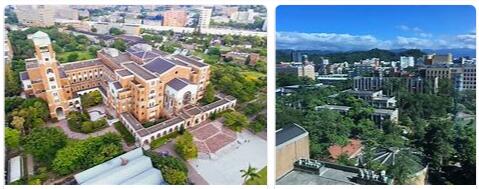
National University of Formosa. Argentine public institution based in the city of Formosa, in northeastern Argentina.
History
The university activity would just start in Formosa with an agreement signed between the Government of the Province and the National University of the Northeast. Later, on March 26, 1971, an Agreement was signed by which the Formosa University Institute was created, which began its activity on April 21, 1972.
In this area, the first Teachers began to function, some of which continue to date, and the Forestry Engineering career was launched in 1973. Later, by Resolution No. 0901/74, the Ministry of Culture and Education of the Nation authorizes the creation of full-term careers that were dictated until that moment, allowing a new registration for the Teaching Staff in Biology, as well as the creation of the Teaching Staff in Agricultural Education Sciences, which would serve as the basis for the eventual creation of the Faculty of Sciences of Agrarian Education, and the career of Forest Engineering, as well as the intermediate degrees that may correspond, as the basis for the eventual creation of the Faculty of Renewable Natural Resources.
Other university activities were aimed at agents who were already working in those areas. Such was the case of the career of Technician in Public Administration or Banking Technician. The term dictation of the Professorships whose registration was carried out in the period between 1970 and 1974 was due to the need to meet specific demands for people who were in activity, although the registration to these careers was open to other applicants.
In the year 1984, the Teaching Staff began to function, among the careers established by the Agreement. In 1986, the Teaching Staff in Differentiated Education and the Teaching Staff in Biology began as stable careers, which continue to the present.
Creation of the National University of Formosa
By Law No. 23,631 of September 24, 1988, the National University of Formosa is created; thus begins the transfer process of the Academic Units dependent on the National University of the Northeast (UNNE), based in Formosa, to what will be the new house of studies.
Faculties
- Faculty of economicsand business
- Health Sciences Faculty
- Faculty of Humanities
- Faculty of production and environment
- Faculty of natural resources
Applied research and extension
Goat productive entrepreneurship
Currently, based on an inter-institutional cooperation agreement in which the UNF participates, a project is being carried out whose objectives are to increase the level of goat meat production in Formosa and generate surpluses for sale.
Recovery of native forests
As well as an essay, called Enrichment Strips: an alternative for the recovery of exploited native forests in the province of Formosa – Argentina. The work is the result of an investigation carried out since 1998 in the Experimental Field of the Forestry Institute, in the Pirané Department, Formosa, which, as a consequence of the pressure exerted by man on the forest resource for years, shows a more heterogeneous composition. forest.
Dengue Outreach
Commitment to society and outreach activities is fundamental in every national university born from the spirit of the 1818 University Revolution, the UNF is no exception, together with the Ministry of Human Development of Formosa, it coordinated the actions of the 44 teams involved to the health campaign. The plan was aimed at ending the vectors that transmit diseases such as dengue and yellow fever, and will have a period of two months. Among others, it involves the tasks of vaccination, fumigation and prevention. The groups were made up of technicians and professionals from the municipality, the Ministry of Health and senior students from the National University of Formosa. The students will organize “vaccination brigades” and will be in charge of clinical analyses.
Services:
The National University of Formosa, together with the Universidad de la Cordillera (Bolivia) and the Instituto Desarrollo (Paraguay) have formed a consortium to launch a model for assessing vulnerability and predicting the impact of climate change in the Gran Chaco Americano. The model designed at a regional and local scale focuses on the sectors of agriculture, livestock and water resources.
The study contemplates the construction of short and medium-term climate scenarios, which will allow decision makers to have a tool to visualize the evolution of the climate and the probability of occurrence of climatic phenomena that can have adverse effects on the economy and the population of the region. As part of the study, it has been contemplated to carry out socialization activities where the most relevant results and findings are highlighted.